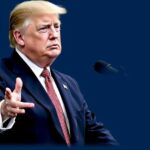Politics
ASIA, BEIJING, BIDEN ADMINISTRATION, CENTER FOR STRATEGIC AND INTERNATIONAL STUDIES, CHINA, COMMUNIST PARTY, FOREIGN MINISTRY, FOREIGN POLICY, GEOPOLITICS, MEXICO, NATIONAL SECURITY, NORTH AMERICA, SCOTT KENNEDY, TAIWAN, TRUMP, U. S, UNITED STATES, US-CHINA RELATIONS, WASHINGTON, XI JINPING
Dante Raeburn
U.S.-China Trade Tensions: A Dangerous Game of Chicken Without Resolution
The trade tensions between the United States and China have heightened, characterized by escalating tariffs and strong rhetoric from both nations. Neither side shows willingness to concede, raising concerns over a potential complete trade breakdown that could have global ramifications. Economists predict more significant impacts on China as its economy grapples with vulnerabilities amid these tensions.
The ongoing trade tensions between the United States and China have intensified, resembling a high-stakes game of chicken without any apparent exit strategy. Both nations are reluctant to show weakness by backing down from the imposition of tariffs, and the potential consequences of a complete trade breakdown could be significant on a global scale. Recent developments include increased tariffs on Chinese goods and strong rhetoric from both sides, indicating an escalation in their adversarial relationship.
On Wednesday, the Trump administration executed a plan to raise tariffs on Chinese exports by 50 percent unless Beijing reversed its own retaliatory tariffs on U.S. products. Currently, the minimum tax imposed on Chinese imports reached an extraordinary 104 percent, suggesting a significant economic strain. The dynamics between President Trump and President Xi Jinping illustrate a mutual unwillingness to concede, which may lead to worsening tensions in other competitive areas, including technology and the situation regarding Taiwan.
Mr. Trump’s aggressive tactics represent a unique approach in U.S. politics, while Mr. Xi’s long-standing political survival strategy contrasts sharply. Experts indicate that the trade conflict entails profound implications for China’s Communist Party, which perceives U.S. actions as a challenge to its legitimacy. Scott Kennedy noted, “Trump has never gone into a back-alley brawl where the other side is willing to brawl and use the same kind of tactics as him” – Source.
China’s economy, already fragile due to property market issues, is now facing risks from a potential global recession. This precarious situation is underscored by recent censorship where Chinese social media outlets have restricted discussions regarding the 104 percent tariff. Wu Xinbo remarked that these tariffs represent a major shock, equating the impact to an earthquake on U.S.-China economic relations, albeit without certain long-term predictions about its effects.
Despite the harsh rhetoric, a complete economic decoupling between the two nations remains unlikely. Many companies, such as TikTok and Starbucks, continue to operate in each other’s markets, and Chinese financial institutions remain connected to the U.S. dollar-based financial system. Mr. Kennedy explained that both nations appear to be engaging in brinkmanship, trying to compel the other to negotiate under pressure.
As China portrays itself as a victim of unfair trade practices, it highlights the irony in its historical restrictions on foreign investment and providing support to its domestic companies. Following the implementation of the tariffs, Mr. Xi convened with senior Politburo members to discuss strengthening ties with neighboring countries and enhancing supply chain collaboration. This underscores a strategic pivot amidst the mounting pressure from U.S. tariffs.
Any disruption in the U.S.-China economic partnership will reverberate globally. Years of trade have formed the foundation of their bilateral interactions. As such, their cooperation on critical global issues like security, climate change, and health crises may be jeopardized by ongoing tensions. China’s attempts to highlight its diminishing dependence on U.S. markets mask extensive internal economic challenges that need addressing, particularly in the wake of a struggling property sector.
Economist Wang Yuesheng emphasized that China is likely to suffer more profoundly from these sanctions than the United States since many Chinese manufacturing businesses are heavily dependent on exports for survival. As the international market contracts further, export-oriented firms producing household goods are at significant risk of collapse. Analysts continue to view the weight of the trade war as heavily skewed against Chinese interests.
With foreign investment retracting due to the pandemic and new regulatory measures, Mr. Xi is endeavoring to attract international investors back. While hosting overseas executives, he acknowledged the role of foreign enterprises in China’s development, recognizing their contributions. Beijing’s current strategy involves resisting U.S. pressures, leveraging the notion that it can endure greater hardship than its American counterpart, according to Evan Medeiros.
In summary, the trade conflict between the United States and China escalates as both sides exhibit a strong inclination to maintain their respective positions on tariffs, potentially leading to a broader economic discord. The fallout from this scenario will not only impact both economies but also affect global markets and international relationships. As each nation braces for a potential prolonged confrontation, economic repercussions could be grave, particularly for China, which faces serious internal challenges.
Original Source: www.nytimes.com






Post Comment